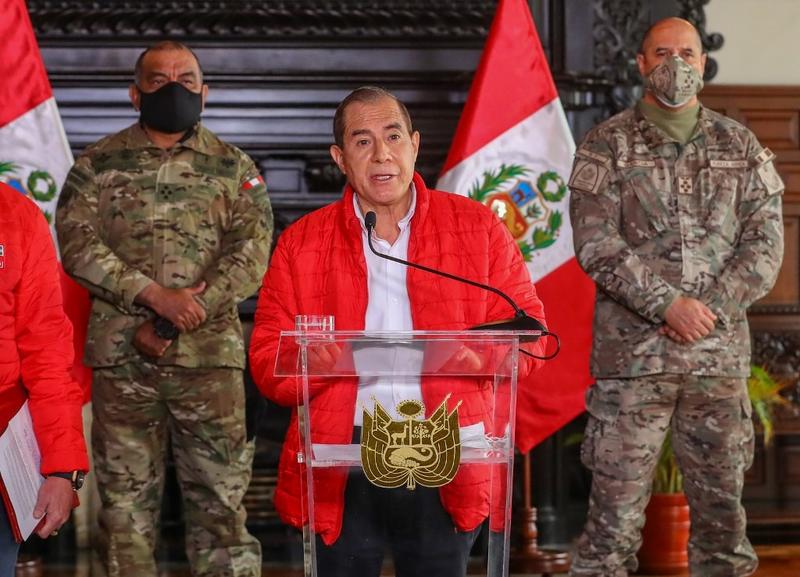 This handout picture released by the Peruvian Presidency shows Prime Minister Walter Martos issuing a statement after the session of the Council of Ministers in Lima on September 12, 2020. (ANDRES VALLE / PERUVIAN PRESIDENCY / AFP)
This handout picture released by the Peruvian Presidency shows Prime Minister Walter Martos issuing a statement after the session of the Council of Ministers in Lima on September 12, 2020. (ANDRES VALLE / PERUVIAN PRESIDENCY / AFP)
Peru President Martin Vizcarra is pushing back on an impeachment attempt, asking the country’s top court to halt the process while accusing the head of congress of involving the military to oust him.
Cabinet chief Walter Martos said the government will file a lawsuit Monday at the Constitutional Court to halt the impeachment proceedings
Cabinet chief Walter Martos said the government will file a lawsuit Monday at the Constitutional Court to halt the impeachment proceedings.
ALSO READ: Peru Congress approves Vizcarra impeachment motion
In a televised address, Martos said “anti-democratic sectors” with “hidden interests” are trying to destabilize Peru’s democratic order at a time when the country is facing a devastating health crisis.
Congress voted late Friday to start the process that could lead to the removal of Vizcarra from office, throwing the country in political disarray amid its worst recession in a century following the coronavirus pandemic.
Lawmakers backing the motion allege Vizcarra sought to obstruct a graft probe into his administration. A final vote is scheduled for Sept 18, after the president has had a chance to defend himself in a congress where he has no representatives.
ALSO READ: Peru, Panama limit men and women to alternate days out to stall virus
Congress is pushing for impeachment “simply with the strength of the votes,” Justice Minister Ana Neyra told RPP radio. Peru’s constitution allows congress to impeach the president on the grounds of “permanent moral incapacity.”
The political turmoil risks weighing on an economy badly battered by COVID-19. With the world’s highest deaths per capita from the coronavirus, the South American nation saw gross domestic product tumble 30 percent in the second quarter, the worst slump of any major economy. It also marks the latest chapter in the history of one of Latin America’s most politically volatile nations.
Political intrigue deepened Saturday when the government said Manuel Merino, the head of congress, made calls to senior members of the armed forces on Thursday, hours before the impeachment motion was presented to parliament. The military officials informed Defense Minister Jorge Chavez about the calls.
ALSO READ: Peru to test Chinese COVID-19 vaccine in phase 3 trial
Merino told reporters he called the head of the navy to assure him of his “absolute respect” for the constitution in the face of a potential political crisis. Merino said he never mentioned the impeachment motion during the call.
The head of congress will replace Vizcarra if he’s impeached, until elections can take place. Peru is due to hold a general election in April, and Vizcarra has repeatedly said he won’t seek a new term.
“These calls were not only careless and out of place, but they also collide with the democratic order,” the defense minister said in the cabinet address. The justice minister said the calls could be considered “an act of sedition.”
The political turmoil has taken a toll: the Peruvian sol was the worst-performing emerging markets currency Friday, losing 0.8 percent versus the dollar, the most in three months. The benchmark stock index also dropped to a one-month low.
READ MORE: Peru is far away, but its friendship with China is close
Vizcarra is the second Peruvian leader facing impeachment proceedings in less than three years. His predecessor, Pedro Pablo Kuczynski, resigned after an opposition lawmaker released videos that showed his allies apparently negotiating votes to stave off his ouster. Two other former presidents are under investigation for graft and another one is in prison.
Since replacing Kuczynski in 2018, Vizcarra, 57, has tried to overhaul the nation’s judicial and political systems, frequently clashing with lawmakers in the process and even dissolving the previous legislature last year.
‘Layer of Uncertainty’
Congress will also vote on Monday on a motion to remove Finance Minister Maria Antonieta Alva from her post, alleging she didn’t do enough to prevent the economic slump during the pandemic.
“This political crisis adds another layer of uncertainty to an economy already stressed by the severe pandemic impact on all grounds,” JPMorgan Chase & Co’s analysts Diego Pereira and Lucila Barbeito wrote in a report Friday. “This new congress has proved even more antagonistic to the government than the previous one, and thus the likelihood of a deeper institutional crisis could not be ruled out.”
Central Bank President Julio Velarde Flores And Finance Minister Maria Antonieta Alva Interview
Maria Antonieta Alva, Peru's finance minister, speaks during an interview in Lima, Peru, on Monday, Jan. 27, 2020. Peru's sol fell for a third day on Monday, weighed down by a stronger dollar and slumping copper prices after Sunday's Congressional election produced a fractured legislature.
Prosecutors and lawmakers this year began probing alleged irregularities in the government’s hiring of a little-known singer to give motivational talks at the Culture Ministry. Richard Cisneros, the singer in question, is alleged to have used contacts in the presidential palace to obtain contracts totaling about US$50,000.
On Thursday morning, lawmakers heard tapes of Vizcarra appearing to speak to officials about Cisneros’ visits to the presidential palace. Less than 12 hours later, they presented a motion to unseat him.
In one excerpt, Vizcarra appeared to have instructed his staff to downplay Cisneros’ visits to the presidential palace. Vizcarra said in a televised address Thursday that the release of tapes was part of a plot by political opponents to remove him from power. The president has said that while the conversations took place, the recordings had been manipulated and contained no evidence of wrongdoing.


